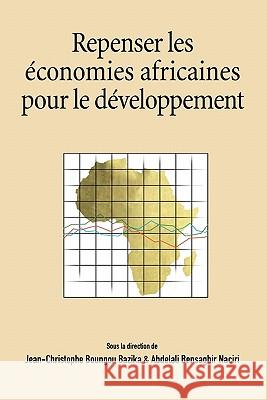Repenser les economies africaines pour le developpement » książka
Repenser les economies africaines pour le developpement
ISBN-13: 9782869783294 / Angielski / Miękka / 2011 / 264 str.
Re-thinking African Economies for Development is delivered in the particularly historic context of the fiftieth independence anniversary of most African countries. This moment, therefore, calls for an assessment and suggestions for new alternatives. African countries have been searching for models of development since attaining political independence. Taking cognizance of the fact that African economies are today stuck in an impasse, many innovative ideas are proffered by the contributors to this book for new development strategies. These ideas are essentially hinged upon the successful experience of countries in Asia and Latin America, and the need to reform the State and bring about development. African intellectuals are called upon in this book to rise up to their responsibility for the production of innovative knowledge that can be used by public and private sector decision makers to raise their communities out of poverty. In this publication, issues of industrialization and diversification of African economies are raised again to decry their limited specialization which exacerbates their vulnerability toward crises. This, to a large extent, is at the root of Africa's marginal status in global trade. Special attention ought to be given to those thousands of micro-economy stakeholders who are actually the backbone of African economies. Regional integration is more and more seen as an imperative for economic development in the context of Africais small sized countries that often fall prey to a great deal of political instability. The issue of financing of development is re-visited, and new ideas are put forth to better channel foreign direct investment and public revenue towards building a more viable monetary and financial system.
Re-thinking African Economies for Development is delivered in the particularly historic context of the fiftieth independence anniversary of most African countries. This moment, therefore, calls for an assessment and suggestions for new alternatives. African countries have been searching for models of development since attaining political independence. Taking cognizance of the fact that African economies are today stuck in an impasse, many innovative ideas are proffered by the contributors to this book for new development strategies. These ideas are essentially hinged upon the successful experience of countries in Asia and Latin America, and the need to reform the State and bring about development. African intellectuals are called upon in this book to rise up to their responsibility for the production of innovative knowledge that can be used by public and private sector decision makers to raise their communities out of poverty. In this publication, issues of industrialization and diversification of African economies are raised again to decry their limited specialization which exacerbates their vulnerability toward crises. This, to a large extent, is at the root of Africas marginal status in global trade. Special attention ought to be given to those thousands of micro-economy stakeholders who are actually the backbone of African economies. Regional integration is more and more seen as an imperative for economic development in the context of Africaís small sized countries that often fall prey to a great deal of political instability. The issue of financing of development is re-visited, and new ideas are put forth to better channel foreign direct investment and public revenue towards building a more viable monetary and financial system.











